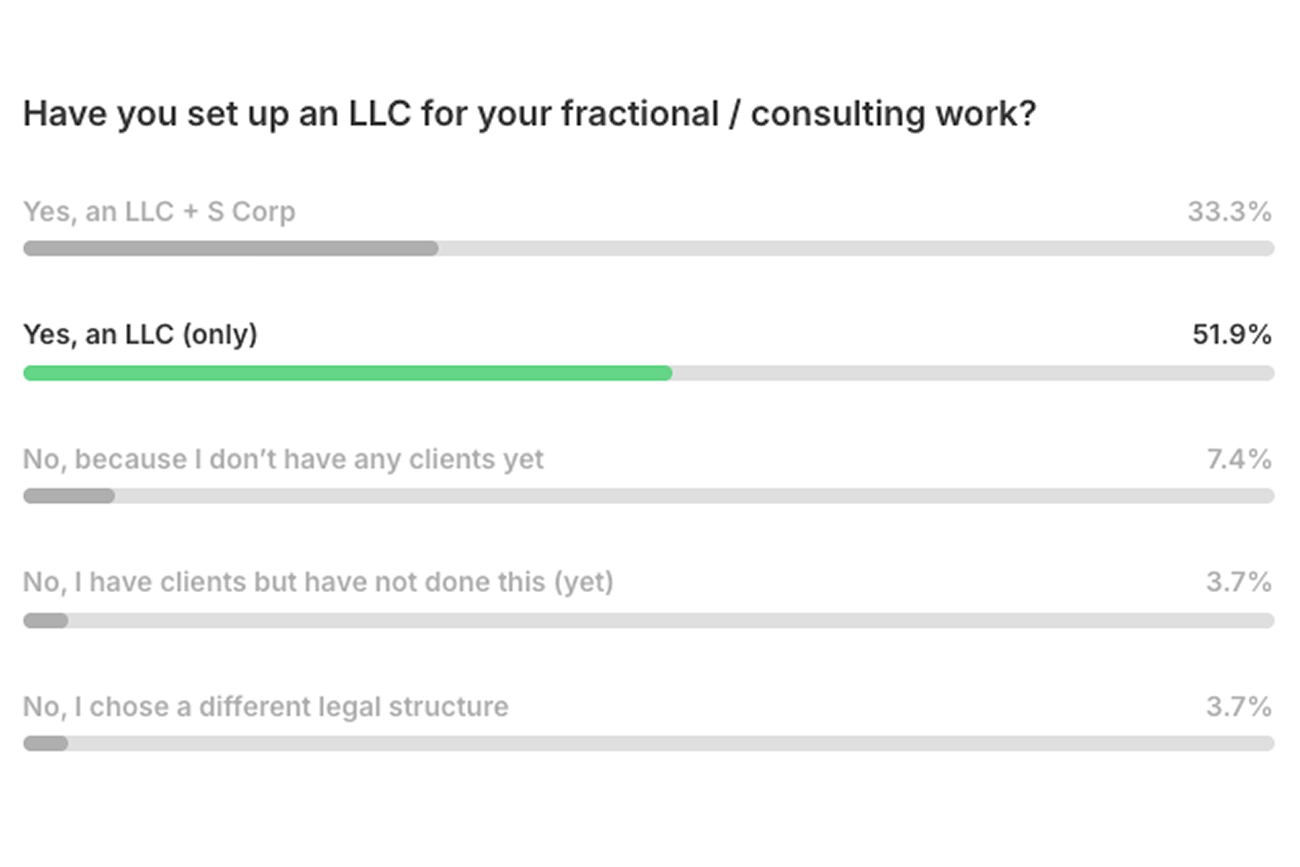How Fractional Workers Can Get the Most Out of Their LLC

Note: This post originally appeared in an edition of the Fractional Jobs weekly newsletter. To subscribe for more, head to https://fractionaljobs.io and add your email address.
I ran a poll in a recent newsletter asking fractionals what legal entity they’ve set up for themselves (LLC, S Corp, something else, nothing, etc.). I was shocked to see a full 53% have set up an LLC, but not elected the S Corp taxation status.
It’s like showing up to an amusement park but not going on any of the rides.
You’re doing the bookkeeping, the business taxes, the expense reporting, etc. of an LLC, but you’re not taking advantage of possibly the single biggest benefit of being self-employed (other than not having a boss, that’s priceless).
The benefit of an S Corp is that it unlocks $5K, $10K, even $20K+ tax savings with a little bit of extra effort. (The savings depends on your situation, e.g. how much you earn.)
AN S CORP IS NOT FOR EVERYONE THOUGH.
So let’s break down what this all even is, who it’s for, why you should (or shouldn’t) do it, and then how.
WHAT is an S Corp?
An S Corp is a tax election you make on top of your LLC, it’s not a replacement. You have an LLC, and then you tell the government you want to be taxed as an S Corp.
If you want to dive into more specifics on the WHAT, you can read more here:
- What is an S Corp and is it Right For Your Business?
- LLCs and S Corps - The Differences & Tax Benefits
WHO should be doing this?
Again, it’s not for everyone. The key criteria are:
- You expect to make $80K+ profit per calendar year doing fractional work
- You see yourself doing fractional work for a while vs. just experimenting with it
- You DON’T have a separate W2 full-time job earning $100K+
- You’re US-based
If this sounds like you, then electing S Corp status might actually be a no-brainer. It was for me when I started doing fractional work.
WHY is this better than an LLC only?
With just a single-member LLC, you’re doing all the back-office work of a business anyway. The bookkeeping, expenses, compliance, taxes, etc.
And you’re paying a 15.3% self-employment tax on TOP of your income tax.
With the S Corp, you can essentially reduce that 15.3% number by a meaningful amount. And that’s what leads to the tax savings.
HOW does an S Corp lower my taxes?
Instead of paying 15.3% self-employment tax on ALL your income, with the S Corp election you only need to pay it for a SOME of your income.
This is because with an S Corp:
- A portion of your earnings is paid to yourself as a “salary”,
- The remainder of your earnings you pay to yourself as a “profit distribution”
Only your salary is subject to the self-employment tax. Your profit distributions are not. So by splitting your earnings into these two buckets, you allow yourself to pay less taxes. (Note: regular income tax is still paid on both, that part is unavoidable.)
An example with $120K revenues
Say you earn $120,000 in revenue this year, with $20,000 in business expenses. That’s $100,000 profit (congrats!). As LLC-only would pay the self-employment tax of 15.3% plus income tax on $100,000 (minus deductions or adjustments.)
An LLC + S Corp might pay themself a salary of $50,000, and pay themself the remaining $50,000 as distributions. You pay 15.3% payroll taxes ONLY on $50,000, not $100,000.
Net net, an LLC-only may pay about $15K in taxes, whereas an S Corp might pay about $8K. That’s a $7K savings.
And if your income is $200K, or $300K, the savings grow too.
How to set up an S Corp
There’s the DIY option, which I won’t cover here because it varies state by state.
But, time is money for fractional workers. So my recommendation is to have someone handle this for you. If you have an accountant you like, get their guidance on if the S Corp status is a good fit for your situation. Then, have them set you up.
Personally, when I started doing fractional work, the thought of using my family’s accountant for this made me shiver. It’d take 5 - 7 business days and 3 voicemails and phone tags to get anything done.
So I ended up looking for other options.
I went with Collective
I signed up for Collective two years ago. Even as my business has evolved into running Fractional Jobs, they’ve still been a great fit for me. They handle all this complexity for me, including the appropriate split between my “salary” and “profit distributions”, estimating the quarterly taxes I owe, handling my books, etc.
In my case, they set me up with an LLC and filed all the paperwork for the S Corp election, but if you have an LLC already they’ll just take it over for you.
Collective costs $350/month all-in. Because they’re a partner, Fractional Jobs subscribers can get the first month free with code “FRACTIONALJOBS” here.
What to Read Next
Want to Read More?
Send fractional jobs,
playbooks, and more to

.svg)
.svg)